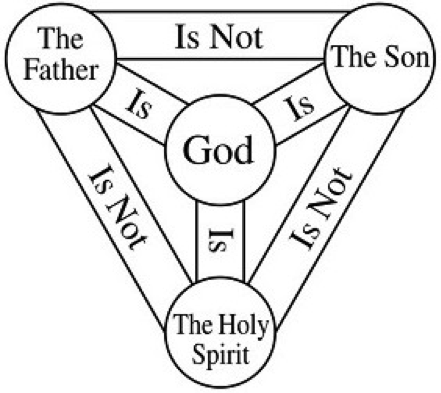Trinity 101: How do we define the Trinity?
Since the trinity paradoxically is both 3 and 1, Christians throughout history have tried to define the triune God through the use of metaphors. For example, you might have heard that God is like an egg: one person of the Trinity is the shell, another one is the white, and the final one is the yolk.
Or maybe you’ve heard that God is like H2O. He presents himself in different persons, the way H2O presents itself as liquid (as water), vapor (as mist), or solid (as ice), but all are still chemically composed of two hydrogen atoms and one oxygen atom. Three phases, one molecule.
While metaphors provide a great starting place to explain the trinity, when pressed, they deteriorate and we enter into hazy theology.
Hazy theology is a major problem, and we can see some of the effects of an incomplete understanding of the trinity in LifeWay Research’s 2016 survey of American views on Christian theology. Bob Smietana summarized LifeWay’s findings regarding the trinity as follows:
Seven out of 10 Americans (69 percent) agree there is one true God in three persons: God the Father, God the Son and God the Holy Spirit. Six in 10 say Jesus is both divine and human (61 percent).
But they’re fuzzy on the details of the Trinity. More than half (52 percent) say Jesus is the first and greatest being created by God. And 56 percent say the Holy Spirit is a force rather than a person. The Holy Spirit seems to be particularly confusing: A quarter (28 percent) say the Spirit is a divine being but not equal to God the Father and Jesus. Half (51 percent) disagree. Twenty-one percent are not sure.
Source: Americans Love God and the Bible, Are Fuzzy on the Details
Rather than relying exclusively on metaphors, a clear and concise definition of the trinity helps to rid misconceptions. God gave us words and minds in order to attempt to make sense of Him, His world, and His people. While the mysteriousness of the trinity will limit our ability to articulate entirely, the definition below helps us to describe the trinity both truthfully and helpfully.
The trinity means that God is eternally one essence with three persons.
Let’s unpack this together. When talking about the trinity, these three terms will help:
- Distinction
- Unity
- Equality
Otherwise known as DUE. You can remember this acronym by thinking “God is due his worship.”
In other words:
- God eternally exists as three persons, Father, Son, and Holy Spirit. The Father is not the Son, the Son is not the Holy Spirit, and so on. (DISTINCTION)
- There is one God (UNITY)
- Each person is fully God. The Father is God. The Son is God. The Spirit is God. (EQUALITY)
So, God is eternal. There was never a point when the Son or the Spirit did not exist. All three eternally are fully God (equality). They all share the same essence, which is to say they are unified. Christians worship one God, not many. Since they share one essence, there is one God (unity). Finally, within the trinity are three different persons. While they share the same essence, they possess unique personhood (distinction). God is eternally one essence with three persons.
This diagram helps to visually show the trinity:

Often, many of us come from traditions that focuses on or elevates one of the persons of God above the other two, like the 28 percent surveyed who said the Spirit is a divine being, but not equal to God the Father and Jesus. You might come from a tradition that seems to worship God the Father, God the Son and God the Holy Book, ignoring the Spirit altogether. Likewise, you might come from a tradition that values the Spirit over and against the role of the Father. Yet, if we could pull up a chair and listen to the internal conversations of the Trinity, we would find mutual deference, differentiated roles, and no matter who spoke, we would recognize God was speaking.
Since God must be the object of our worship, this understanding of the trinity as eternally one essence with three persons allows us to worship the triune God truly. As we covered in our earlier post, misunderstanding of who God leads us to worship idols. If we worship a false understanding of the trinity, we worship God falsely.
In our next few posts, we’ll dive into the evidence we have for each aspect of our definition of the trinity, starting first with “distinction.” As always, leave us some comments with your thoughts and questions. We’d love to hear from you.

